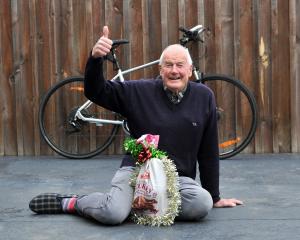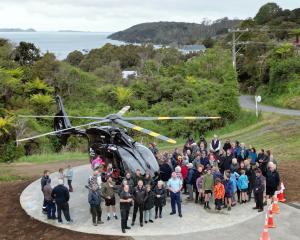Superintendent Andrew Coster became the Southern district commander only months before Bradley (9) and Ellen (6) Livingstone were shot in their beds by their father Edward Livingstone in January 2014.
Livingstone then turned the gun on himself in the front bedroom of the St Leonards house he formerly shared with now estranged wife Katharine Webb and the children.
The Chief Coroner today released her findings into an inquest into the children's deaths. Supt Coster said it made him question whether police had done enough to protect the children.
"Any case like this shakes you and makes you question whether we are doing everything we can do.
"Much as we deal with difficult things all the time, it doesn't fully prepare you for when something like this goes wrong - it's difficult.''
Judge Deborah Marshall found that Livingstone was "competent to make his own decisions'' when he killed the children with a 12-gauge Stoeger shotgun on January 15 last year.
Supt Coster said he believed changes to Southern police since the tragedy would prevent them from making the same mistakes again.
'Lucid and vengeful' father
A lucid and vengeful father was ultimately responsible for the tragic deaths of Bradley and Ellen Livingstone, Justice Marshall found.
However, multiple failings by agencies charged with protecting the children and Ms Webb meant that ''red flags'' were missed, and the full extent of the risk posed to the family went undetected.
Livingstone had been drinking in the hours before he killed his children, but toxicology reports showed that his blood alcohol level was 47mg of alcohol per 100ml of blood - well below the legal limit to drive at the time of the deaths.
''Edward ... appeared until the very end to be hedging his bets," Judge Marshall said. ''On the one hand, he was taking actions about future events - his new relationship, his new flat, checking the Barnados appointment, getting his prescription filled.
"At the same time, he had taken the spare key from Mr Mans' (his former flatmate Philip Mans) house and made sure he had access to 9 Kiwi St through the rarely used door.''
Livingstone burst into Ms Webb's house about 9.30pm on the day of the shootings carrying the shotgun, cartridges and a plastic container of petrol.
Ms Webb fled her bedroom and left the house, running to the home of neighbours Christopher and Melanie Foot. She heard several gun shots while escaping.
Livingstone then shot the children as they slept, firing three cartridges into Bradley's chest and one at Ellen.
No marks were found on Bradley's body to indicate that a struggle had taken place, and Ellen was shot while lying underneath her duvet, Judge Marshall said.
Protection order breaches
Livingstone was convicted of arson and assault in Australia in 1988.
In the months before the children's deaths, he was twice charged with breaching a protection order preventing him from contacting Ms Webb.
Ms Webb sought the protection order and it was first issued on May 31, 2013 and finalised on August 13.
On August 7, 2013, Livingstone breached the order for the first time.
Before the inquest, held from April 21 to 24 in Dunedin this year, the Chief Coroner identified a number of issues relating to the case:
- How Livingstone was able to receive police diversion - against national policy - for the first breach of the protection order.
- Whether the court was aware of all the relevant information relating to the case when sentencing Livingstone for this second breach of the order.
- Whether Livingstone's psychiatrist and psychotherapist were aware of all the relevant information of the case when they prepared reports for the court.
- What actions police or other agencies could have taken to protect Ms Webb and her children.
Judge Marshall noted that although red flags were missed by the agencies protecting Ms Webb and her children and that failings allowed Livingstone's risk to his family to go undetected, that "best practice'' by police and various social agencies might not have "altered the tragic outcome''.
The Chief Coroner found health professionals needed to take care when providing reports to court. Police should also review how incidents of family violence were recorded and whether the adult sexual assault regime instituted in the Southern district should be implemented nationally.
The collective agencies charged with protecting the victims of family violence should regularly audit which cases were discussed, what information was provided at meetings between the groups and what actions were taken following meetings, she found.
Police accept findings, changes made
Southern district police accept the Coroner's findings, Supt Andrew Coster said today, and a police review of the case resulted in a number of changes made.
They included a dedicated adult sexual assault and child protection team, specialising in the handling of cases relating to adult sexual assaults and child protection was established with Southern CIB, he said.
All CIB and frontline uniform officers were also trained in the handling of adult sexual assault complaints and cases.
National police also acknowledged the recommendations made by Judge Marshall as a result of the hearing.
The police national intelligence application (NIA) provides the facility for officers to enter and view information about family violence occurrences, including in relation to the individual offenders and victims involved.
It was regrettable in this case that the facility was not used to the extent it could have been when officers became aware of certain events during the case, police said.
This was covered as one of the issues in the reviews following the case and officers have had this function and the necessity to record all family violence related events re-confirmed, police said.
Police, along with partner agencies involved in the Family Violence Inter-agency Response System, reviewed the structure and planning behind their regular meetings and implemented a new system.
This included the distribution of cases before a meeting so each agency had the opportunity to search their databases to assess and flag risks on individual cases so relevant information was available during the meetings.
Supt Andrew Coster today acknowledged the courage demonstrated by Ms Webb during the inquest.
"We extend our utmost sympathy to Katharine for her loss in this situation and thank her willingness to engage constructively with police following this tragic incident.''
Significant failures, police admit
During the final day of the inquest, an emotional Supt Coster recounted Dunedin police's significant failures in their handling of Edward Livingstone, admitting: "We fell short".
He said he would not speculate about whether police could have prevented the deaths if the mistakes had not been made.
"You are asking me to speculate what would have occurred if A, B, C, D had happened - I simply can't do that. All I can do is comment on what didn't occur."
Police failed to record and investigate some bullet cartridges that were given to the children by Livingstone, ostensibly as a present.
They also failed to appropriately follow up on Ms Webb's disclosure that Livingstone had trapped her in her room and raped her for five hours, at times while her distraught daughter banged on the bedroom door.
"Anything could have affected the final outcome,'' Supt Coster conceded at the inquest when asked by Anne Stevens, counsel for Ms Webb, if the police's failure to follow up those matters might have contributed to the deaths.
Despite their failures police were ''well intentioned'' in their handling of the Livingstone matter, he said.
"Police are 100% committed to protecting victims and this is a really tragic case, but we can't change what happened,'' said Supt Coster, choking back tears.
Livingstone told several people about thoughts he had had of killing his children. However, those scenarios did not involve shooting them, Supt Coster said.
"The ideation he suggested was using an axe. He had a sick ideation and [it] suggested a level of commitment to carry out these acts,'' he said.












